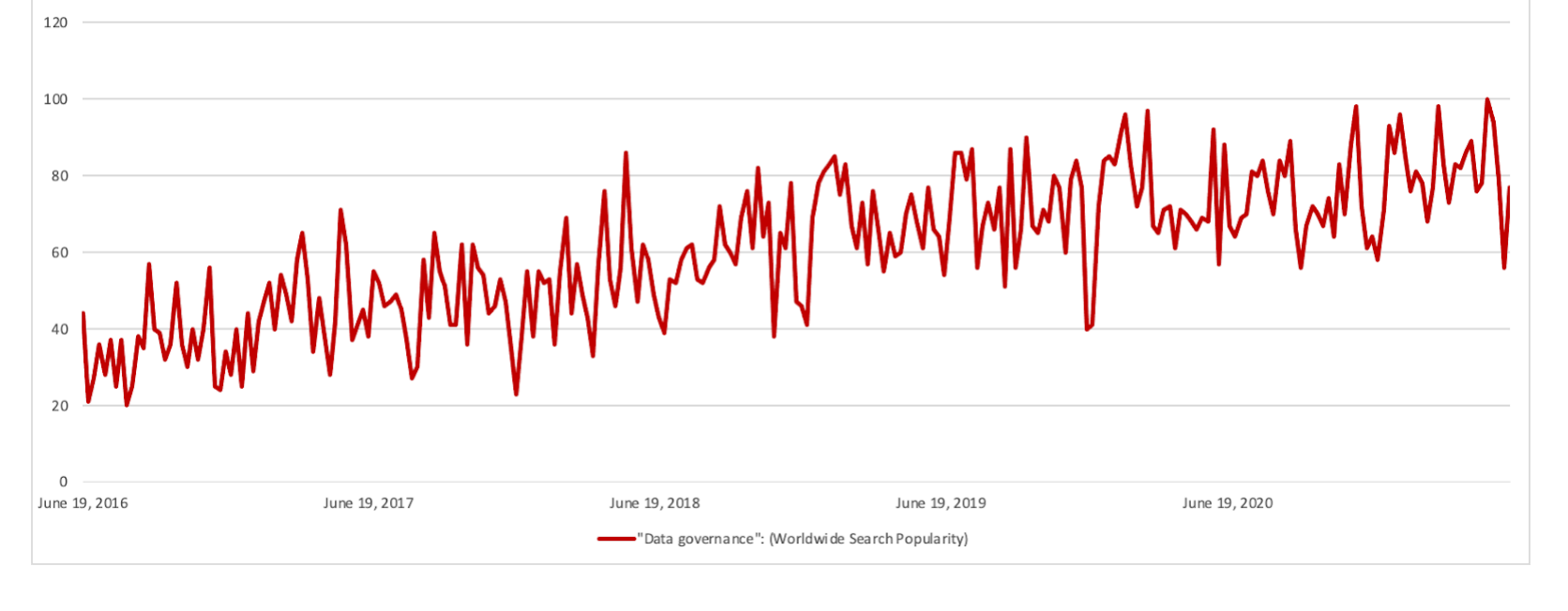Interest in data governance is on the rise. The number of people worldwide searching for ‘data governance’ on Google has grown steadily since 2016. Data governance has also taken centre stage in the development space--the World Bank’s landmark 2021 World Development Report: Data for Better lives put it at the center of its analysis.
Despite this growing interest, no operational or commonly agreed-upon definition of data governance exists. Perspectives on what it means for data to be well governed vary. The term “data governance” doesn’t appear in mainstream English dictionaries. Formal agency definitions tend to reference broad concepts like accountability, decision-making rights and power relations as well as practical concerns of data “processes and rules.” Google searches relating to data governance indicate that the term is associated with data protection and data management and that searchers often seek information related to the “benefits of data that is well governed.”

The absence of a common understanding of data governance can lead to growing power imbalances over concentration of data benefits, lack of oversight from citizens and the public sector on data use, and can also result in perpetuating harms. Even our use of Google Analytics in this post highlights the questions of power that lie at the heart of data governance by relying on a private company that curates information without public oversight to measure public interest in data governance itself. These dynamics are rarely addressed by definitions that focus on practices, processes and rules.
Conflicting perspectives on data governance in development
This definition vacuum is starkly apparent in the data for development community, with practitioners and experts holding different views on the scope of data governance and what this means in practice.
Current interpretations generally break down along three dimensions relating to conceptual definitions, organizational goals and the level of implementation:
- Data governance includes technical and normative definitions. For some, it represents a technical concept related to data management, access rights and technical infrastructure for data management. For others, it encompasses normative elements such as the balance of power among actors and the distribution of accountability, rights and value related to data. For many, data governance includes a bit of both.
- The purpose of data governance varies by sector and community. Professional and sectoral communities define data governance through the lens of their unique goals, interests and mandates. For instance, international organizations tend to interpret data governance as including policies on personal privacy and cross-border data flows. Private companies on the other hand see it as a matter of managing access and creating accountability for data-driven decisions.
- Data governance manifests at different levels. Personal data governance applies to how individuals decide to share and use their own data. Data governance also concerns how local and national governments manage complex data ecosystems. It also has a supranational dimension related to international trade, multilateral rules and agreements and-increasingly-to geo-political divides.
These differences emerged in public discourse precisely because of the success of the data revolution. We have seen remarkable progress and value in the use of new data sources for development. But as such innovations have shined a spotlight on the topic of data governance, many of the promises of the data revolution have not yet materialized. The development community is just starting to reckon with the negative externalities and direct effects of the increasing availability and use of data. In this context, unpacking what constitutes good data governance and how it can help deliver on the Sustainable Development Goals becomes not only necessary but urgent.
Our approach to pushing reflections further
The Data Values Project is well-placed to navigate these diverse and often conflicting perspectives. The Global Partnership for Sustainable Development Data’s Technical Advisory Group members—particularly those leading a second track of action on Data Governance—are engaged on the front lines of activity and debates in data governance in international development today.
Some of us come from the official statistics community and the UN Statistical Commission’s work on data stewardship. Our members also include activists building a movement to protect digital rights in the wake of COVID-19 and researchers studying governance frameworks and data responsibility. We represent civil society organizations experimenting with new models for multi-stakeholder data governance and companies establishing practical tools for ethical oversight and sustainable models for data sharing.
Drawing on these and other connections, our track will bring diverse stakeholders together to shed light on what data governance means within different sectors, regions and communities. Our engagement so far indicates a need to explore others’ perspectives to identify areas of consensus and disagreement where more discussion, research and experimentation are required.
Through the Data Values Project, we will:
- Reflect on how good data governance can contribute to addressing, instead of reproducing, structural inequalities and
- Explore opportunities and priorities for change in current data governance approaches at the local, national and international levels.
Building on areas of consensus, we are working to identify the specific elements necessary for good data governance. Ultimately, we will be advocating the changes needed to establish a clear mandate for better data governance. Do not hesitate to share your perspective on what data governance means and send your thoughts and contributions to [email protected].
Francesca Perucci of the United Nations Statistics Division, Frédéric Pivetta of Dalberg Data Insights, Camilo Andres Mendez Coronado and Karen Lizeth Chavez Quintero of the Departamento Administrativo Nacional de Estadística (DANE) and Tom Orrell of DataReady co-lead the Data Values Project track on 'Data that is well-governed'.
GPSDD’s Jenna Slotin and Martina Barbero provided input into this blog.